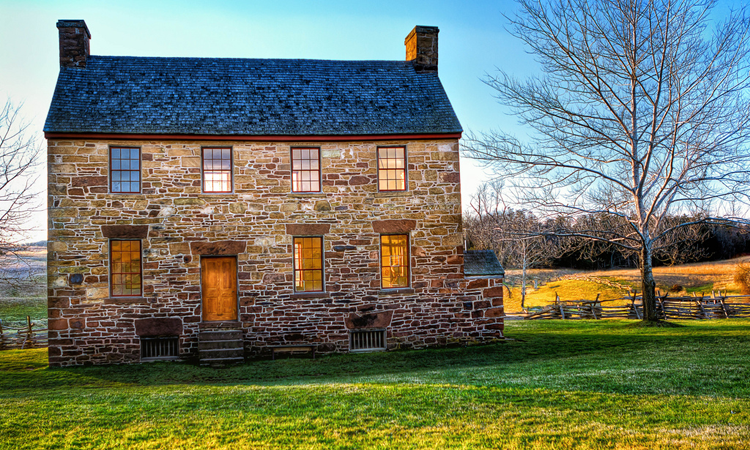
In the late 1950s, my parents moved to a house on a dirt road in Hunterdon County, New Jersey. It was an area rich in history, the DAR (Daughters of the American Revolution, for those of you free of the colonial past), and houses and barns dating back three hundred years. The house had a past. There was a family tree, researched by the last owners, which listed the name of each family to have lived in the house. Excavation of the dirt cellar revealed rusted, primitive leg chains, crudely cut; it was most likely a way station on the Underground Railroad. And there were ancient garbage dumps containing a treasure trove of old blue glass bottles. The property came with seventy acres of forest, including many rows of pine trees planted during the Great Depression.
In the early days, we were little kids on a great adventure. The house needed major work, but we felt like we were camping out. Things got more serious when fall arrived and then winter cold, with fires and a coal stove going twenty-four hours a day to keep us warm. Those first few years were rough and challenging. My father became ill and could not work. My mother, unused to rural life, had a hard time adjusting.
But pretty soon, our house became the country experience for the city people my parents had left behind. We were more ethnic than our neighbors, but compared to our family and friends back in the Italian neighborhoods of Brooklyn, we were strange hybrids. And so we grew over the years, in other directions—different from the rest of our extended family, yet also not like the people of our community. But home was always The Pines, a solid stone house built in 1725, surrounded by fields and woods.
It was gutted and expanded and endlessly repaired by my strong and capable brothers. But it still remained monolithic in its stone heaviness. Over time, it evolved into more than a house, as homes often do. It became the place where we all shared a history pockmarked by the scars of a sometimes harsh early childhood of dark, drafty rooms, no central heat, and dining on game and day-old baked goods. There were also giant apple pies, homemade goat cheese and milk from the characters inhabiting the barn, and a keen sense of the woods and nature. We swam in a creek and fished for dinner. And we stood among immense pine trees, calf-deep in needles that blanketed all other vegetation, silently waiting for a strong breeze. One large pine tree whispers; you feel it in your head, on your face. Thousands of pine trees together sweep through you and lift your spirits.
We left home, one at a time, living in apartments, then houses of our own. We all grew up, but always came “home” for big family meals, with joy and anticipation, each of us with memories and stories both hairy and hysterical at which spouses and friends could only shake their heads. We were outliers before any of us heard the word.
These occasions were memorable because we laughed loud and long. The five of us together was a party. Anyone else we pulled into our circle became family at the table. We ate and felt full of good food and lucky to have each other. And each gathering eased a tiny bit of what scarred us, and made us feel like there was a circle of people who knew. Even when we visited each other and gathered at one another’s homes, dinners at “Mommy’s house” were still the real family gatherings, special to all of us.
But life goes on. We lost a brother. The table does not feel as crowded…nor is the circle complete. And with each year, we realize it is broken and can never be fixed. There is no understudy for his part of us. We have grown children who know this as Nana‘s house. There are grandchildren, very young, utterly adorable. But they have no idea who we were and what we survived, how we laughed and cried, how we lived. They will have only dim memories of this place with its giant and cavernous fireplaces and arched beams of wood so old and hard you cannot hammer a nail into them.
When the inevitable comes to pass, and my mother is no longer here, my sister, too, will leave The Pines for a home that will feel more like her own. It‘s been exhausting keeping the house and my mother going. To be perfectly honest, our attachment to “home” is far less than our desire that mother be at home. Still, when the last one of us leaves, the change will be profound. There will no longer be one place to gather and be us. Instead, there will be four.
Click here to see Rose’s tips for healthy and happy relationships

